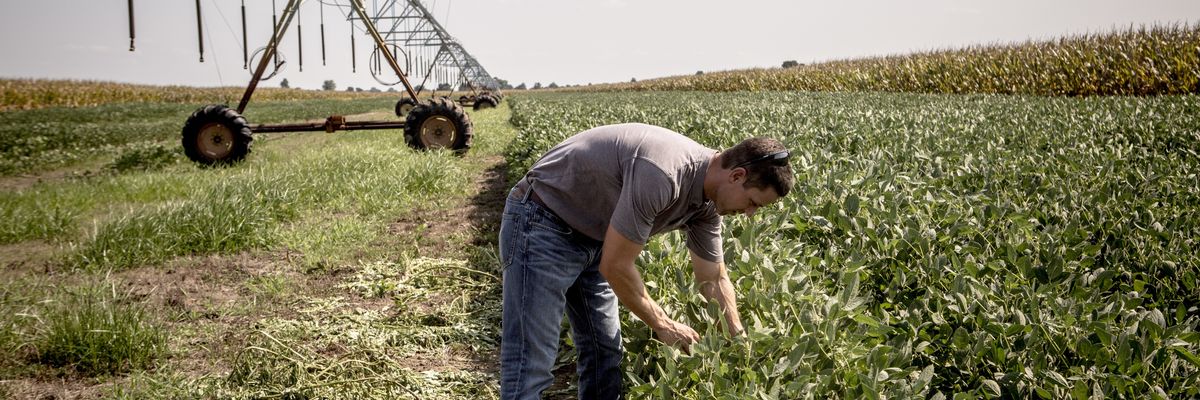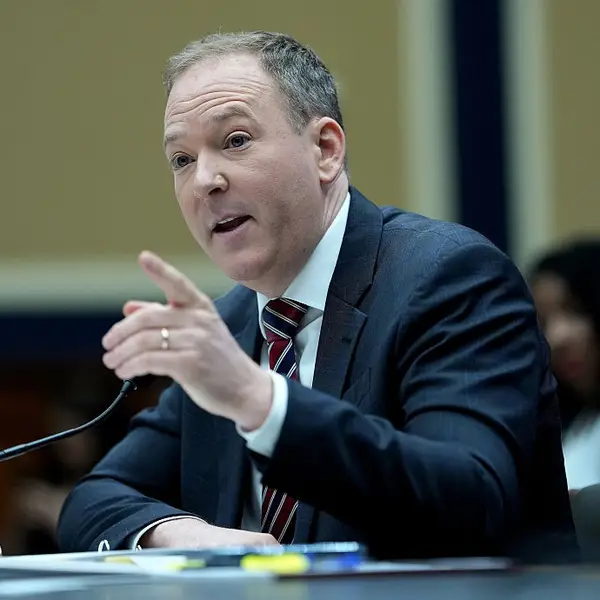
Farmer Brad Rose, who doesn't use dicamba, looks at rows of soybean that show signs of having been affected by the herbicide in Mississippi County, Arkansas on August 9, 2017.
Watchdogs Upset EPA Has 'Once Again Failed' to Limit Dicamba Herbicide Harm
"EPA has clear, damning evidence its mitigation has utterly failed to protect farmers, the environment, and endangered species," said the Center for Food Safety legal director.
"I call bullsh*t."
That's how Nathan Donley, environmental health science director at the Center for Biological Diversity, responded Thursday to the U.S. Environmental Protection Agency (EPA) issuing limited restrictions for the use of over-the-top dicamba herbicides in four states.
Noting that it has been over a year since the Biden administration released a report "detailing just how incredibly devastating the 2020 dicamba approval has been," Donley said, "And now we're supposed to believe that four states not being able to use dicamba for two weeks in June accomplishes something?"
Under the EPA's rules for the 2023 season, farmers in Illinois, Indiana, and Iowa can't apply the herbicides Engenia, Tavium, and XtendiMax after June 12 or the V4 growth stage for soybeans and first square for cotton—whichever comes first. The previous end date for those states was June 20, which is the new cutoff for South Dakota, where farmers previously had until June 30.
Some experts warn that the timing of the EPA's move is "troubling" given the proximity to soybean planting. University of Illinois weed scientist Aaron Hager told FarmProgress that "it's going to be a challenge. I'm afraid for soybean farmers who have already made their seed and herbicide purchases for the 2023 growing season."
Meanwhile, longtime critics of the herbicide like Donley and George Kimbrell, legal director at the Center for Food Safety, called out the EPA for continuously failing to go far enough to limit harm from dicamba, given concerns about drift damage.
"This marks the fifth time in seven years EPA has made changes to dicamba's registration," Kimbrell said in a statement. "Yet faced with a mountain of data that its past measures have utterly failed to protect farmers, the environment, and endangered species, EPA once again failed to make meaningful changes."
"What EPA revised only affects four of 34 states, offers nothing to admitted continued risks to endangered species, and makes a label that already was impossible to follow in real-world farming even more impossible to follow," Kimbrell added.
"If allowed to stand, EPA's capitulation to pesticide companies will condemn many thousands of farmers to another year of devastating dicamba clouds injuring their crops, endangering their livelihoods, and tearing apart their rural communities," he warned, vowing to continue doing "everything we can to stop this harm."
An Urgent Message From Our Co-Founder
Dear Common Dreams reader, The U.S. is on a fast track to authoritarianism like nothing I've ever seen. Meanwhile, corporate news outlets are utterly capitulating to Trump, twisting their coverage to avoid drawing his ire while lining up to stuff cash in his pockets. That's why I believe that Common Dreams is doing the best and most consequential reporting that we've ever done. Our small but mighty team is a progressive reporting powerhouse, covering the news every day that the corporate media never will. Our mission has always been simple: To inform. To inspire. And to ignite change for the common good. Now here's the key piece that I want all our readers to understand: None of this would be possible without your financial support. That's not just some fundraising cliche. It's the absolute and literal truth. We don't accept corporate advertising and never will. We don't have a paywall because we don't think people should be blocked from critical news based on their ability to pay. Everything we do is funded by the donations of readers like you. Will you donate now to help power the nonprofit, independent reporting of Common Dreams? Thank you for being a vital member of our community. Together, we can keep independent journalism alive when it’s needed most. - Craig Brown, Co-founder |
"I call bullsh*t."
That's how Nathan Donley, environmental health science director at the Center for Biological Diversity, responded Thursday to the U.S. Environmental Protection Agency (EPA) issuing limited restrictions for the use of over-the-top dicamba herbicides in four states.
Noting that it has been over a year since the Biden administration released a report "detailing just how incredibly devastating the 2020 dicamba approval has been," Donley said, "And now we're supposed to believe that four states not being able to use dicamba for two weeks in June accomplishes something?"
Under the EPA's rules for the 2023 season, farmers in Illinois, Indiana, and Iowa can't apply the herbicides Engenia, Tavium, and XtendiMax after June 12 or the V4 growth stage for soybeans and first square for cotton—whichever comes first. The previous end date for those states was June 20, which is the new cutoff for South Dakota, where farmers previously had until June 30.
Some experts warn that the timing of the EPA's move is "troubling" given the proximity to soybean planting. University of Illinois weed scientist Aaron Hager told FarmProgress that "it's going to be a challenge. I'm afraid for soybean farmers who have already made their seed and herbicide purchases for the 2023 growing season."
Meanwhile, longtime critics of the herbicide like Donley and George Kimbrell, legal director at the Center for Food Safety, called out the EPA for continuously failing to go far enough to limit harm from dicamba, given concerns about drift damage.
"This marks the fifth time in seven years EPA has made changes to dicamba's registration," Kimbrell said in a statement. "Yet faced with a mountain of data that its past measures have utterly failed to protect farmers, the environment, and endangered species, EPA once again failed to make meaningful changes."
"What EPA revised only affects four of 34 states, offers nothing to admitted continued risks to endangered species, and makes a label that already was impossible to follow in real-world farming even more impossible to follow," Kimbrell added.
"If allowed to stand, EPA's capitulation to pesticide companies will condemn many thousands of farmers to another year of devastating dicamba clouds injuring their crops, endangering their livelihoods, and tearing apart their rural communities," he warned, vowing to continue doing "everything we can to stop this harm."
- Farmers, Conservation Groups Challenge EPA's Unlawful Re-approval of Dangerous, Drift-Prone Dicamba Pesticide ›
- 'Just the Beginning': Appeals Court Affirms Pesticide Giants Liable for Dicamba Drift ›
"I call bullsh*t."
That's how Nathan Donley, environmental health science director at the Center for Biological Diversity, responded Thursday to the U.S. Environmental Protection Agency (EPA) issuing limited restrictions for the use of over-the-top dicamba herbicides in four states.
Noting that it has been over a year since the Biden administration released a report "detailing just how incredibly devastating the 2020 dicamba approval has been," Donley said, "And now we're supposed to believe that four states not being able to use dicamba for two weeks in June accomplishes something?"
Under the EPA's rules for the 2023 season, farmers in Illinois, Indiana, and Iowa can't apply the herbicides Engenia, Tavium, and XtendiMax after June 12 or the V4 growth stage for soybeans and first square for cotton—whichever comes first. The previous end date for those states was June 20, which is the new cutoff for South Dakota, where farmers previously had until June 30.
Some experts warn that the timing of the EPA's move is "troubling" given the proximity to soybean planting. University of Illinois weed scientist Aaron Hager told FarmProgress that "it's going to be a challenge. I'm afraid for soybean farmers who have already made their seed and herbicide purchases for the 2023 growing season."
Meanwhile, longtime critics of the herbicide like Donley and George Kimbrell, legal director at the Center for Food Safety, called out the EPA for continuously failing to go far enough to limit harm from dicamba, given concerns about drift damage.
"This marks the fifth time in seven years EPA has made changes to dicamba's registration," Kimbrell said in a statement. "Yet faced with a mountain of data that its past measures have utterly failed to protect farmers, the environment, and endangered species, EPA once again failed to make meaningful changes."
"What EPA revised only affects four of 34 states, offers nothing to admitted continued risks to endangered species, and makes a label that already was impossible to follow in real-world farming even more impossible to follow," Kimbrell added.
"If allowed to stand, EPA's capitulation to pesticide companies will condemn many thousands of farmers to another year of devastating dicamba clouds injuring their crops, endangering their livelihoods, and tearing apart their rural communities," he warned, vowing to continue doing "everything we can to stop this harm."
- Farmers, Conservation Groups Challenge EPA's Unlawful Re-approval of Dangerous, Drift-Prone Dicamba Pesticide ›
- 'Just the Beginning': Appeals Court Affirms Pesticide Giants Liable for Dicamba Drift ›

